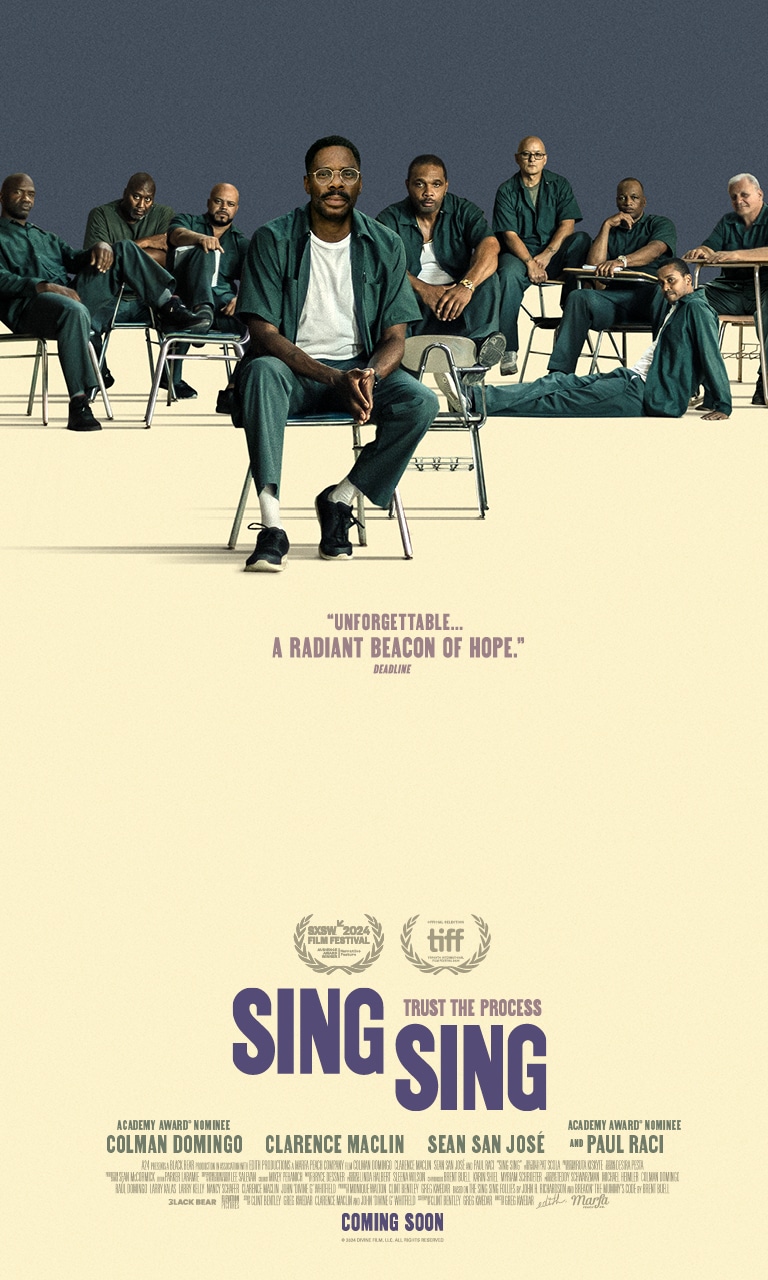
- Starring
- Colman Domingo, Clarence Maclin, Paul Raci
- Writers
- Clint Bentley, Greg Kwedar
- Director
- Greg Kwedar
- Rating
- 14A (Canada), R (United States)
- Running Time
- 105 minutes
- Release Date (US)
- July 12th, 2024
- Release Date (CAN)
- August 2nd, 2024 (limited)
Overall Score
Rating Summary
It would be a vast understatement to state that the U.S. prison system is deeply flawed. Inmates are often stripped of their humanity and treated uniformly, regardless of the severity of their crimes. However, within this soul-crushing environment—where there’s little sense of community and prisoners are conditioned to remain on high alert—some correctional facilities have invested in reform programs to help inmates grow and learn to contribute to society in meaningful ways. One of the most notable examples is the Rehabilitation Through the Arts (RTA) program at Sing Sing Correctional Facility, one of the world’s most notorious maximum-security prisons. RTA has proven to be an effective initiative, providing inmates with the clarity and tools they need to move forward.
Greg Kwedar’s moving drama, Sing Sing, explores the importance of rehabilitation programs within the prison system. Loosely adapted from a 2005 Esquire article about the RTA program at Sing Sing, the film tells the story of a group of inmates who use theatre and acting as a means to reclaim their humanity. Colman Domingo plays Divine G, a fictional character serving as a conduit for audiences. It’s revealed early on that Divine G is an innocent man who was wrongly convicted, and has been fighting to prove his innocence for over a decade. While incarcerated, he channels his passion for theatre and screenwriting into organizing a theatre troupe, inspiring several inmates to seek community and channel their sorrows into art. When Clarance “Divine Eye” Maclin (Maclin), a dangerously unpredictable and anger-fueled inmate, joins the Sing Sing RTA program and reveals himself to be a passionate actor with ideas for improving the program, it sparks a complicated relationship between he and Divine G.
Unlike many films based on inspirational true stories that succumb to Hollywood clichés and risk dehumanizing their subjects for profit, Sing Sing strives for authenticity. While it is a narrative feature, Kwedar approaches the film with a documentary-like sensitivity. Apart from Domingo and Paul Raci (Buell), the cast is comprised of non-professional actors who are alumnus of the RTA program at Sing Sing, portraying versions of themselves. Sharing the screen with Oscar-nominated veterans is no easy task, especially considering the vulnerability required to tell a story this personal and important. It’s hard to believe this is the on-screen debut for many of these actors, as they confidently showcase the performance skills they have honed over their time within the RTA program.
Kwedar deserves recognition for fostering an environment where his cast could feel comfortable bearing their souls, scars and all—a challenge most actors never face. While directing is often praised for unique visual styles or innovative storytelling methods, Sing Sing abstains from using bells and whistles. His approach is hands-off and understated, but it’s a remarkable achievement that should be celebrated. Kwedar draws impeccable performances from his actors, crafting a film that feels deeply personal and profoundly moving. As Divine G, Domingo delivers a gentle, emotionally charged and captivating performance, once again proving that he is one of the best actors working today. He conveys the pain of having to live out his days behind bars for a crime he didn’t commit in a devastating fashion. It’s clear that his love for theatre and the community he has built through RTA is the only thing keeping him going. While Domingo is phenomenal in the leading role, the main takeaway many will have is that Maclin is an absolute star. Formerly incarcerated at Sing Sing and is an alumni of the RTA program, the caliber of his performance is that of a seasoned actor who channels his experiences into a deeply lived in performance that is impossible to take one’s eyes off of.
While Sing Sing mostly avoids falling into many of the same trappings that most modern prison movies fall victim to, due to the authenticity of its casting and the focus on the theatre program, it is perhaps too narrowly focused. The large majority of the film takes place within the theatre room and focuses on the RTA participants practicing their latest play leading up to their performance. While these sequences are exhilarating and shot in a way to make the audience feel like they are watching these characters practice a dress rehearsal, the film would have benefited from spending more time outside of RTA practices. A deeper dive into the daily lives of the inmates could have provided a more comprehensive view of the challenges they face and the significance of the program in their overall journey toward personal growth and redemption.
Nonetheless, Sing Sing remains a remarkable achievement, with awards worthy performances from Colman Domingo and Clarence Maclin, whose portrayals bring a profound sense of authenticity and emotional depth to the screen. The film is a testament to the power of storytelling and community, both within the film and within the real lives of the inmates, showing that even in the darkest of places, art can be a beacon of hope and a path to reclaiming one’s humanity.
still courtesy of Elevation Pictures
If you liked this, please read our other reviews here and don’t forget to follow us on Twitter or Instagram or like us on Facebook.

Discover more from
Subscribe to get the latest posts sent to your email.
